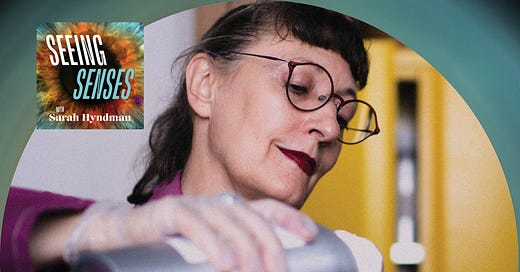Episode 03. Composing perfumes with Sarah McCartney
Why is making a fragrance like composing music?
Episode 03
Composing perfumes with Sarah McCartney
Why is making a fragrance like composing music?
Artisan perfumer Sarah McCartney takes us through the connections between scent, perception, and creativity. She talks about working with the Courtauld Gallery London, the queen of modern burlesque Tempest Rose and Chocolat author Joanne Harris.
This episode is also available via: Apple Podcasts // Spotify // Amazon Music // YouTube
I hear smells as sounds.
Mint’s really pointy 🎵. Whereas oakmoss is more like 🎶 … it’s much more calm and soft and smooth.
Discover how shutting your eyes can enhance your sense of smell, the unique ways in which individuals perceive fragrances, and the challenges of conveying scent through words. The conversation delves into McCartney’s journey as a perfumer, her innovative projects that connect scent with art and culture, and the emotional power of smell in memory. The episode highlights the importance of cross-modal experiences and the potential for scent to evoke deep emotional responses.
Guest
Sarah McCartney is the founder of artisan fragrance house 4160 Tuesdays. She taught herself to make perfume after careers in copywriting, marketing, and teaching, including head writer for Lush Cosmetics. Since 2011, she has challenged the secrecy of the perfume industry by running workshops, launching Scenthusiasm.School for beginners, and representing artisan perfumers on the IFRA UK Executive Committee. She co-wrote The Perfume Companion, speaks internationally, and her fragrances have been shortlisted for major awards including the Fragrance Foundation and Art & Olfaction. Her projects span operas, galleries, and gardens. She is a regular contributor to BBC Radio, answering questions about the fragrance industry.
What book has inspired you?
Sarah’s book recommendation is Doughnut Economics by Kate Raworth, see all book recommendations here.
“If you shut your eyes, you can smell better. Generally, if you want to appreciate a fragrance, then shut out all the other distractions because the brain will give priority to sight.”
Key takeaways
• Shutting your eyes can enhance your sense of smell.
• People perceive scents differently based on personal experiences.
• Creativity involves connecting different sensory experiences.
• Scent can evoke strong memories and emotions.
• The language of scent is often limited and subjective.
• Art can be enhanced by incorporating scent into the experience.
• Creating scents for exhibitions involves collaboration and creativity.
• Scent can influence how we perceive other sensory experiences.
• Olfactory habituation can affect our perception of familiar scents.
• Scent can be a powerful tool for storytelling and memory recall.
Outline
Exploring the Connection Between Sight and Scent.
The Language of Scent and Perception.
Creativity and Cross-Modal Connections.
Creating Scents for Art and Exhibitions.
The Burlesque Perfume Project.
The Essence of Saltburn Driftwood.
The Influence of Visuals on Smell.
Crowdfunding Fragrances: A New Approach.
Creating a Fragrance Inspired by Chocolat.
The Complexity of Scent Perception.
Childhood Memories and Scent Associations.
The Power of Smell in Memory and Emotion.
The objects that makes Sarah both shudder and feel happy at first sight.
When noise cancelling headphones improve your sense of smell.
Host
Sarah Hyndman is a designer/researcher, author and speaker. You can book her to speak or bring her activity lab to your event or organisation here via Type Tasting. Sarah is the founder of Type Tasting and curator of The Sensologists.
Seeing Senses. Where there’s more than meets the eye.
How you can support this podcast
As a paid subscriber or recommend Sarah to colleagues or clients to give a talk or run an activity lab event. Senses are a strategy not an add-on. “Sarah’s talk was a game-changer” SXSW, “Left a lasting buzz and excitement behind her” BBC, ‘F*!*ing genius!’ Adobe MAX.
Theme music by AudioKraken. Thank you to Radim Malinic for the inspiration to make a podcast, and to podcasters Mili Tharakan, Klaudia Mitura and Suze Cooper for your generous advice.






